
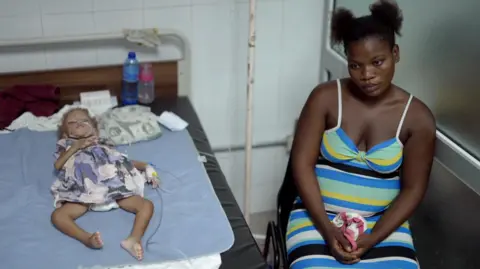 Jack Garland, BBC
Jack Garland, BBCTwo-year-old Shayna is hooked up to an intravenous drip at one of the few functioning hospitals in Haiti's capital, Port-au-Prince. Her mother, Venda, desperately hopes this will alleviate the frail little girl's severe malnutrition.
Shaina is one of 760,000 children on the brink of starvation in Haiti.
Fearful of the gang war raging in her neighborhood, for weeks Venda was too afraid to leave her home to seek treatment for her daughter.
Now that she has arrived at the children's ward, she hopes it is not too late for Shayna.
“I want to get proper care for my baby, and I don’t want to lose her,” she says, crying.
Haiti has seen a wave of gang violence since the assassination of then-President Jovenel Moise in 2021, and an estimated 85% of the capital is now under gang control.
Even inside the hospital, Haitians are not safe from the fighting, which the United Nations says has killed 5,000 people this year alone and left the country on the verge of collapse.
The hospital's medical director explains that the previous day, police clashed with gang members in the emergency department among terrified patients.
Victims of violence are everywhere. One section is full of young men with gunshot wounds.
Pierre is one of them.
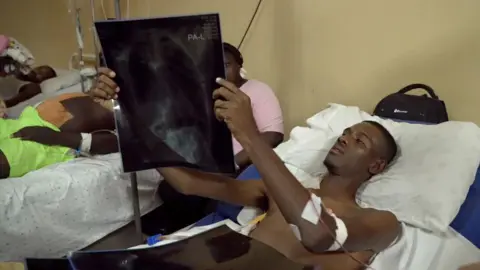 Jack Garland, BBC
Jack Garland, BBCHe says he was returning home from work when he was caught in the crossfire of a street battle, and a bullet pierced his collarbone.
He says about the young people who make up a large percentage of the groups terrorizing the capital: “I think that if the government had been more stable and had put in place better programs for young people, they would not have gotten involved in gangs.”
To combat the increasing violence, the UN Security Council authorized the establishment of a multinational security support mission (MSS) in October 2023.
The Kenyan-led force was deployed in Haiti six months ago, primarily funded by the United States, and tasked with restoring law and order.
On patrol in downtown Port-au-Prince, the ferocity of gang violence is evident.
Kenyan officers roam the streets in heavy armored personnel carriers through once-bustling areas of the capital that are now deserted. Shops and homes are closed.
Burnt cars and debris are piled high along side streets, barricades erected by gangs to prevent access.
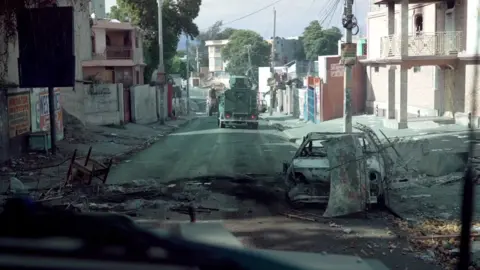 Jack Garland, BBC
Jack Garland, BBCThe convoy is making its way through the rubble when suddenly it comes under fire.
Bullets struck the armor of the armored personnel carrier while Kenyan police responded with assault rifles through weapons ports in the vehicle's walls.
After nearly an hour of shooting back and forth, the convoy continued on its way.
But it won't be long before signs of more horrific gang violence emerge. A human body burning in the middle of the street.
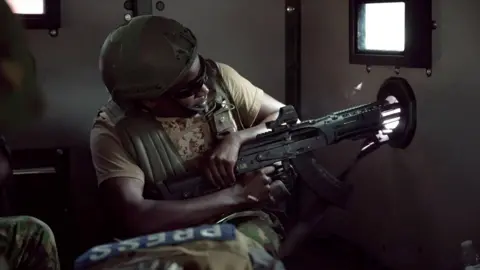 Jack Garland, BBC
Jack Garland, BBCOne of our Kenyan APC policemen says he was a suspected gang member who was cornered and killed by a rival group, and set his body on fire to send a grisly warning.
The Kenyan officers on our patrol are now used to seeing this kind of brutality on the streets of Port-au-Prince, but they also tell us they are exhausted.
Four hundred officers arrived in June, but their numbers were significantly outnumbered. In July, the Haitian government estimated that there were 12,000 armed gang members in the country.
The Kenyans promised additional staff. When the United Nations authorized the mission, it was envisaged that a force of 2,500 troops would be sent, but this support, which was supposed to arrive in November, has not yet materialised.
Despite the current situation, the force's leadership remains optimistic. Commander Godfrey Otong is under pressure from the Kenyan government to make this mission a success.
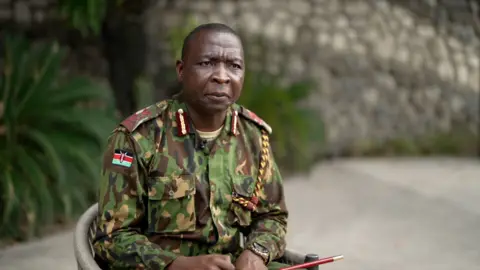 Jack Garland, BBC
Jack Garland, BBCThe mission commander says there is “overwhelming support” for the MSS in Haiti.
He says: “The residents are asking our team to expand and go to other places and calm the situation.”
The uphill struggle they face is evident at the former Haitian police station, which was once occupied by a gang but has now been retaken by Kenyan forces.
The building remains completely surrounded by gangs, and when officers go up to the roof, they come under sniper fire.
Kenyan officers returned fire while urging everyone to stay down.
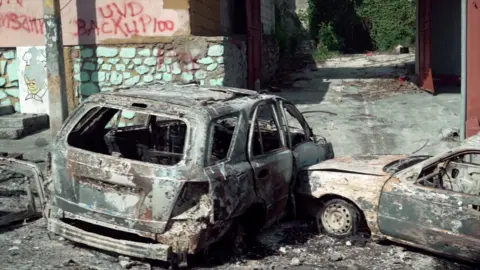 Jack Garland, BBC
Jack Garland, BBCKenyan officers say some of their much-delayed additional troops will arrive by the end of this year, bringing their total to 1,000 soldiers.
Support is urgently needed. There are areas in Port-au-Prince that are so tightly controlled by gangs that it is difficult for the police to penetrate.
In one such area, Jeremy's Wharf, nearly 200 civilians were killed by a single gang over a single weekend earlier in December.
In all, it is estimated that up to 100 gangs operate in the Port-au-Prince area, with boys as young as nine joining their ranks.
The problem seems to be growing. According to the United Nations Children's Fund, UNICEF, the number of children recruited into gangs has increased by 70% in one year.
One of the gang leaders who comes to them is T-Lapley, whose real name is Renell Destina.
As head of the Gran Ravine gang, he commands more than 1,000 men from his fortified headquarters above Port-au-Prince.
Gangs like his have exacerbated an already dire situation in Haiti and are known to slaughter, rape and terrorize civilians.
Gran Ravine is known for carrying out kidnappings for ransom, a practice that has earned Ti Lapli a place on the FBI's Most Wanted List.
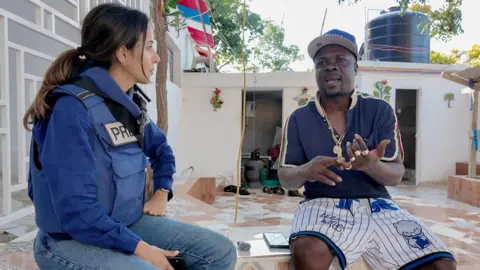 Jack Garland, BBC
Jack Garland, BBCT. Lapley tells us that he and his gang members “love our country very much” — but when pressed about gang rapes and murders like those inflicted on civilians, he claims his men “do things they weren’t supposed to do (to members of rival gangs) because the same “It happens to us.”
He says the reason children join Gran Ravine is simple: “The government doesn't create any jobs. It's a country that has no economic activity at all. We live on garbage. It's basically a failed state.”
He failed to acknowledge the stifling influence of gangs like his on Haiti's economy. Civilians are often afraid to leave their homes to work, and are regularly blackmailed for money as well.
With 700,000 residents forced to flee their homes due to violence by groups such as Gran Ravine, the capital's schools have become camps for internally displaced people.
Negociant is one of those who had to seek shelter.
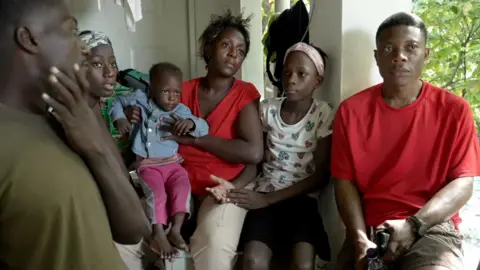 Jack Garland, BBC
Jack Garland, BBCShe sits with her five children, confined to a small section of the school balcony that they now call home.
“A few weeks ago I was living in my house,” she says. “But the gangs took over my neighborhood.”
She explains that she left for an area of the city called Solino, until the gangs overran it as well and she fled with hundreds of other people.
“Today, once again, I am on the run to save my life and my children,” she says.








